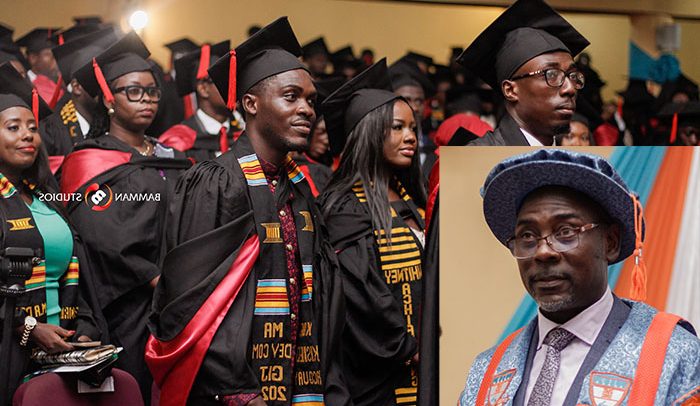Some of the graduates at the ceremony. INSET: Professor Kwamena Quansah Aidoo
MANAGEMENT of the Ghana Institute of Journalism (GIJ) has announced the introduction of Master of Arts (MA) programme in Investigative Journalism.
The course, scheduled to commence in June/July this year, forms part of the institute’s efforts of staying on top of competition among institutions of higher education in Ghana.
The Rector of the institute, Professor Kwamena Quansah Aidoo, made this announcement while delivering his address at the second session of the institute’s 13th congregation held at the College of Physicians and Surgeons in Accra last Friday.
He stated, “The programme, being the first of its kind to be run in the country, will aim at producing a corps of professional and motivated journalists who will take advantage of the passage of the Right to Information Law to help fight corruption and various abuses in public spaces, with the hope of making it accessible to other African countries.”
Other programmes, including Master of Arts (MA) and Master of Philosophy (M Phil) in Environmental Communication, Political Communication and Marketing, will also be introduced this year.
He said work was far advanced on both undergraduate and postgraduate programmes while management worked towards completing accreditation processes for the new programmes.
He touched on the freedom of the media in Ghana, taking strong exception to the menace of assault on journalists and media practitioners in the country. He cautioned journalists to be professional in their utterances.
Besides, he urged state institutions, civil society and the citizenry not to allow the canker of attacking journalists with impunity to fester.
“It is a menace that must not be allowed to denigrate and derail more than a quarter of a century of constitutional practice in Ghana which has made the media one of the pillars of our democracy,” he stressed.
On her part, Madam Beatrice Agyeman, Chief Executive Officer (CEO) of TV3, urged the graduates to adopt a totally new culture of journalism and media practice.
“I urge you all to adopt a new culture of communication born out of investigation and fact-checking to distinguish yourselves,” she pointed out.
She said as media practitioners, they must seek facts in their reportage, stressing that “the truth must never take a backseat when reporting the fact.”
She also urged them to desist from being “overly sensational” when reporting on the coronavirus in Ghana.
By Nii Adjei Mensahfio


